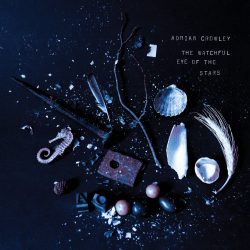A spellbinding voice draws you in while gentle melodies and lyrics capture a mysterious kind of magic.
 “Day One, I stole onboard a northbound ship / No one saw me or my shadow / On the gangplank / For that I am thankful,“ comes Adrian Crowley’s hauntingly imposing Leonard Cohen-esque baritone voice against an ominous drumbeat on ‘Northbound Ship’, the opening track on his ninth studio album ‘The Watchful Eye of the Stars’. This was an album recorded both in a home and studio environment, the tracks being worked up from ones initially recorded by Crowley on instruments as basic as a cheap nylon-stringed charity shop guitar, while revered musician John Parish acted as producer.
“Day One, I stole onboard a northbound ship / No one saw me or my shadow / On the gangplank / For that I am thankful,“ comes Adrian Crowley’s hauntingly imposing Leonard Cohen-esque baritone voice against an ominous drumbeat on ‘Northbound Ship’, the opening track on his ninth studio album ‘The Watchful Eye of the Stars’. This was an album recorded both in a home and studio environment, the tracks being worked up from ones initially recorded by Crowley on instruments as basic as a cheap nylon-stringed charity shop guitar, while revered musician John Parish acted as producer.
‘I Still See You Among Strangers’ sees Crowley adopt more of a wavering falsetto, and his distress comes through clearly against an evocative musical backdrop (“When I take to the comfort of the city streets / After waking myself from troubled sleep / Down darkened stairs into the blaze outside / When the glare lingers in my eyes”). ‘Underwater Song’, detailing a tortured return to a now-submerged neighbourhood, see Crowley return to his more familiar deeper vocal style with great effect, adding an extra layer to such a haunting tale.
‘Bread and Wine’ has an airier feel, and it’s lyrically lighter too, taking the form of a letter to a loved one informing them of a newly lived life (“I found a halfway room in a seaside town / I’ll stay here for a while / Through my window I can hear the ship bells ring / And I wake to the smell of the brine”). Gentle harmonies add an extra layer to ‘The Colours of the Night’, a tender tale of melancholic loss with a soft flute carrying the melody. ‘The Singalong’ is anything but its title as Crowley speaks mournfully against a rich backdrop of strings, while the conversational ‘Ships on the Water’ looks at life through a more circumspect, spectatorial lens (“Seven days of solitude / A room by the water / Ships pass my window / Seven times a day”).
Birds feature heavily one-two tracks: ‘A Shut In’s Lament’ and ‘Crow Song’; on the former, Crowley tells of a feathered visitor offering some joy to an otherwise lonely existence filled with morphine and waking dreams that verge on nightmares (“Little bird of sunshine / Oh tell me of the things you’ve seen / Out over the rooftops / Beyond the veil of my dreams”), while on ‘Crow Song’ – more spoken-word piece than song – we hear the warming true story of solitary injured crow rescued by Crowley’s brother and the joy found it helping it recover and the mixed emotions when it eventually flies away (“Solitary crow with a cripple wing / Then I lost sight of you and you were gone / And I was joyous for you / But shattered none-the-less”).
“And the rain gets sweeter / And the salt turns to sugar,” repeats Crowley on ‘Northbound Ship’, and it’s an apt description for the alchemy of his music: he takes sometimes sour themes and turns them into something addictively sweet by making them just so captivating; and that’s the kind of sweetener that does nothing to the body, but it certainly feeds the soul.


